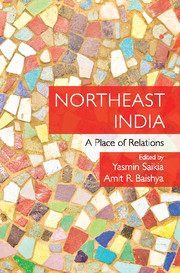Book contents
- Frontmatter
- Contents
- List of Figures
- List of Boxes
- List of Tables
- Acknowledgments
- Introduction
- Section I Contemporary Politics and Issues of Definition
- 1 Solidarity, Visibility and Vulnerability: ‘Northeast’ as a Racial Category in India
- 2 India and its Northeast: Another Big Push without a Take-Off?
- 3 (Un)natural Disasters and the Role of the State in the Brahmaputra Valley, Assam
- Section II Creating Presence
- Section III Knowing through Experience
- Section IV Rethinking Politics
- Glossary
- About the Contributors
- Index
2 - India and its Northeast: Another Big Push without a Take-Off?
from Section I - Contemporary Politics and Issues of Definition
Published online by Cambridge University Press: 23 July 2017
- Frontmatter
- Contents
- List of Figures
- List of Boxes
- List of Tables
- Acknowledgments
- Introduction
- Section I Contemporary Politics and Issues of Definition
- 1 Solidarity, Visibility and Vulnerability: ‘Northeast’ as a Racial Category in India
- 2 India and its Northeast: Another Big Push without a Take-Off?
- 3 (Un)natural Disasters and the Role of the State in the Brahmaputra Valley, Assam
- Section II Creating Presence
- Section III Knowing through Experience
- Section IV Rethinking Politics
- Glossary
- About the Contributors
- Index
Summary
‘How many people find their lives developed by development?’
– Eduardo Galeano‘We seem to be living modernization twice, the first time as earnestness, the second time as irony.’
– Frederick CooperNot many years ago these portions of the Indian Empire were undeveloped, and, in part unexplored, and some of them given up to savagery and disorder, but since they have been brought within the magic circle of Pax Britannica they have exhibited steady and increasing promise of future prosperity … From Manipur, to Mandalay the Viceregal progress has been safely conducted in a region where insurrections, violence and gang robbery have been until recently, chronic and ineradicable.
The passage is from a London Times editorial of 1900, a commentary on the travels of George Nathaniel Curzon, Viceroy of India, through Assam and Burma in March of that year. The colonial province of Assam roughly corresponds with today's Northeast India (NEI). The idea that the region is on a path to ‘future prosperity,’ that it would leave its ‘undeveloped’ past behind – one fraught with ‘chronic’ and ‘ineradicable’ violence – is a familiar trope in Indian policy discourse on NEI these days. Evidently, the same trope was used more than a century ago under very different political conditions.
What was behind the optimism about Assam's development in 1900? The province saw exceptional economic growth during the closing decades of the nineteenth century, thanks to the expansion of the tea industry and the discovery of oil. The period is the focus of economic historian Amalendu Guha's article ‘A Big Push without a Take-Off.’ Between 1871 and 1901, railways and tea plantations expanded significantly in Assam. The coal, oil and timber industries also grew. Tea production went up from 6.2 million pounds to 72 million pounds in those three decades. Yet Assam's economy did not experience a ‘take-off.’ Guha argued that it was because the economic policies pursued by the colonial government were designed exclusively to serve metropolitan interests. The railways, for instance, were ‘aligned wastefully … to the utter neglect – even detriment of local development interests.’ He compared the growth of tea exports from Assam to that of raw silk from Japan during the same period.
- Type
- Chapter
- Information
- Northeast IndiaA Place of Relations, pp. 45 - 67Publisher: Cambridge University PressPrint publication year: 2017
- 2
- Cited by



